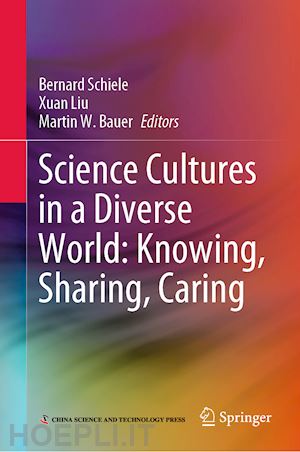Bernard Schiele (Ph.D.) is Professor of Communications in the Faculty of Communication at University of Quebec at Montreal. He teaches and lectures frequently in North America, Europe, and Asia and has been working for a number of years on the socio-dissemination of science and technology (S&T). He is Member of several national and international committees and is Regular Consultant on scientific culture matters to government bodies and public organizations. He is also Founding Member and Current Member of the Scientific Committee of the PCST network. He chaired the International Scientific Advisory Committee for the New China Science and Technology Museum (2006–2009). He was Member of the Expert Panel on the State of Canada’s Science Culture (2013–2014). He has many publications, such as Le musée dans la société [Museum in society] (OCIM, 2021); Communicating Science: a global perspective, (ANU, 2020); Musées Mutations [Museums, Mutations] (OCIM, 2019); Science Communication Today-2015 (PUN, 2015); Les Musées et Leurs Publics: Savoirs et enjeux [Museums and Their Visitors: Knowledge and Challenges] (PUQ, 2014); Science Communication Today: International Perspectives, Issues and Strategies (CNRS, 2013); Science Communication in the World: Practices, Theories and Trends (Springer, 2012); Communicating Science in Social Contexts: New Models, New Practices (Springer, 2008). He is the recipient of the ICOM-Canada International Achievement Award (2012).
Xuan LIU studied in Anhui-Hefei and at the London School of Economics and Political Science (LSE), and holds a PhD from the University of Science and Technology of China (USTC). She is currently an Associate Research Fellow and the Deputy Director of the Institute of Innovation Environment of National Academy of Innovation Strategy, China Association for Science and Technology (CAST). Her research focuses on science culture, the academic environment and the innovation ecology. She has presidedover 43 research projects, including a European Commission Horizon 2020 program GENDER STI. She has published 57 academic papers on international journals. From 2014 to 2018, she served as Member of the Scientific Committee of Public Communication of Science and Technology (PCST), and has been Member of the Scientific Committee of “Science & You” and one if the founders for World Investigation of Science Culture (WISE) research network since 2018. In 2019, she was selected as the "Young Talents in China", and was awarded the "National Women's Achievement Model" by All-China Women's Federation.
Martin W Bauer read Psychology and Economic History (Bern, Zurich, London), and is Professor of Social Psychology and Research Methodology, London School of Economics and Political Science (LSE). A former Editor-in-Chief of Public Understanding of Science (2009-2016), he investigates ‘common sense’ in a comparative perspective and particularly in relation to science andemerging technologies. His international network MACAS [mapping the cultural authority of science] conducts attitude surveys, mass media mappings and qualitative enquires on controversial techno-science. Recent book publications include: The Psychology of Social Influence – Modes and Modalities of Shifting Common Sense (CUP 2021); The Cultural Authority of Science – Comparing across Europe, Asia, Africa and the Americas (Routledge Studies of Science, Technology & Society, 40, 2019); Atom, Bytes & Genes – Public Resistance and Techno-Scientific Responses (Routledge 2015).











